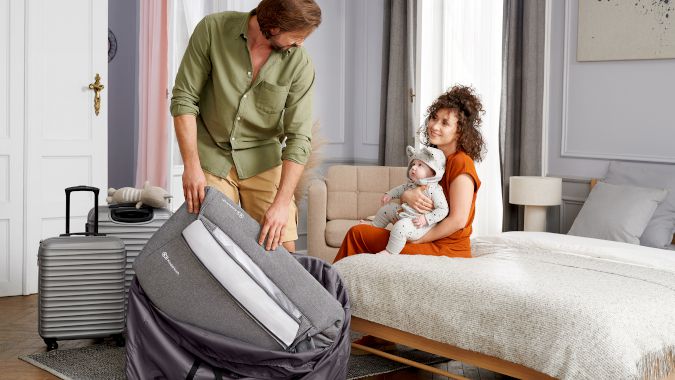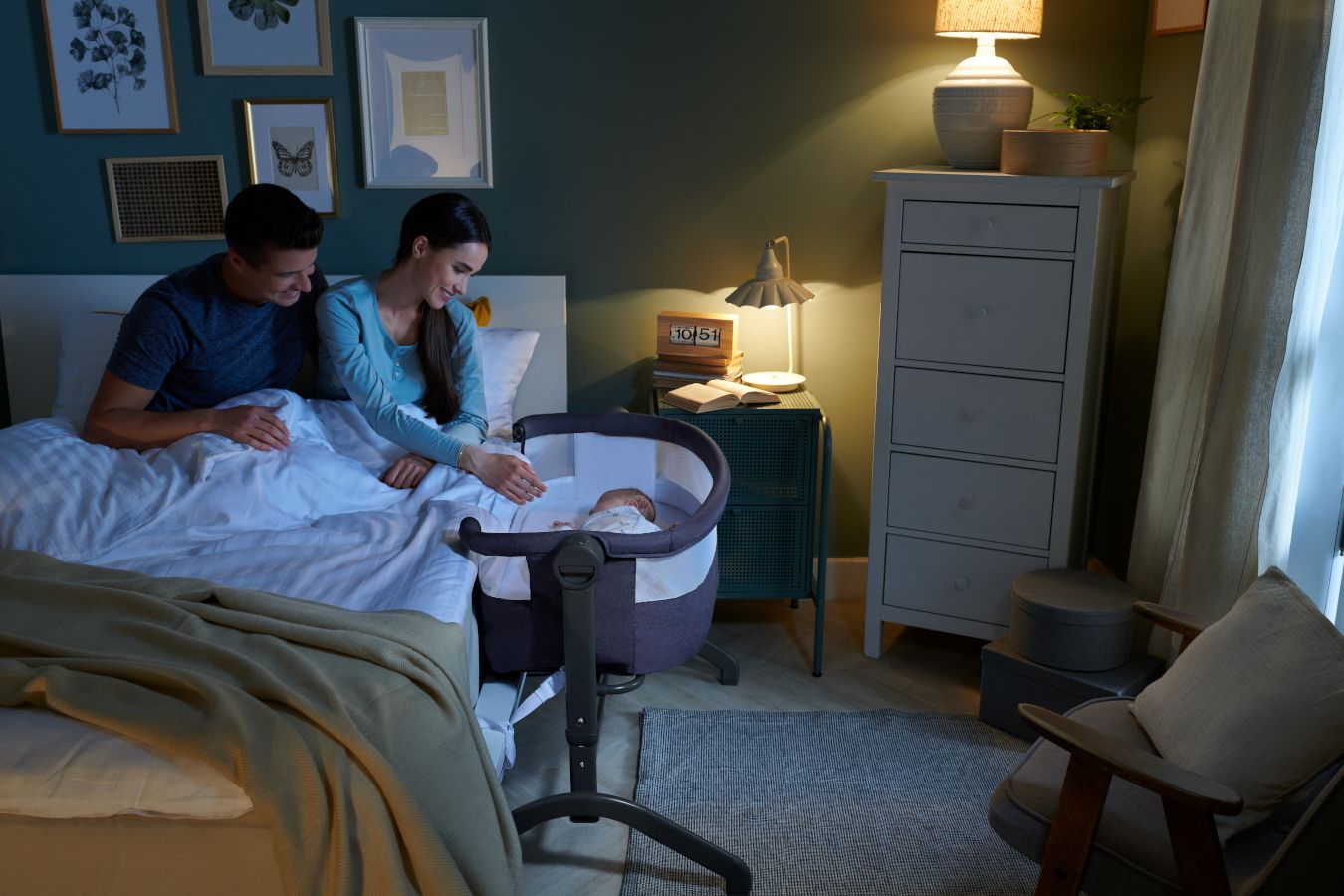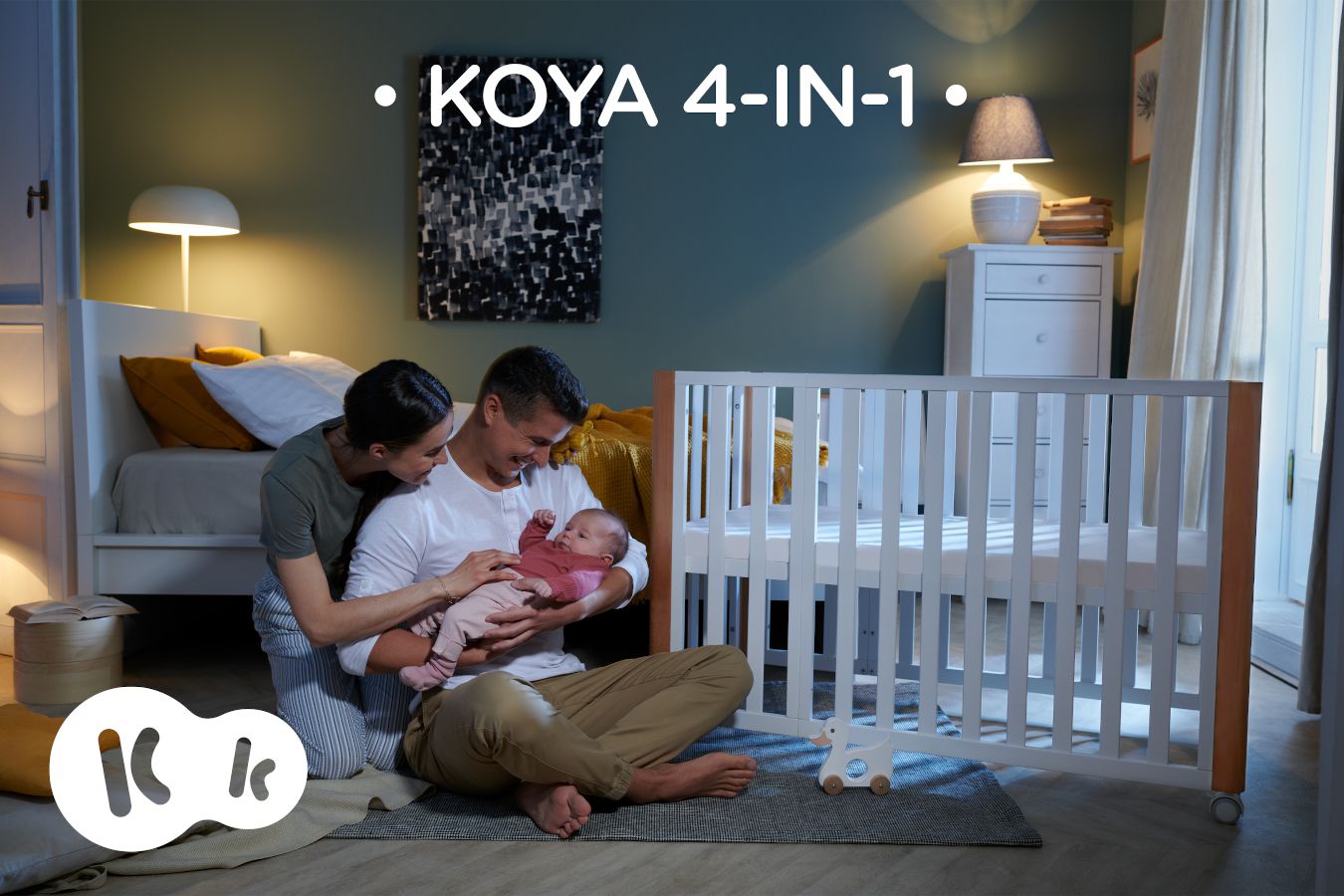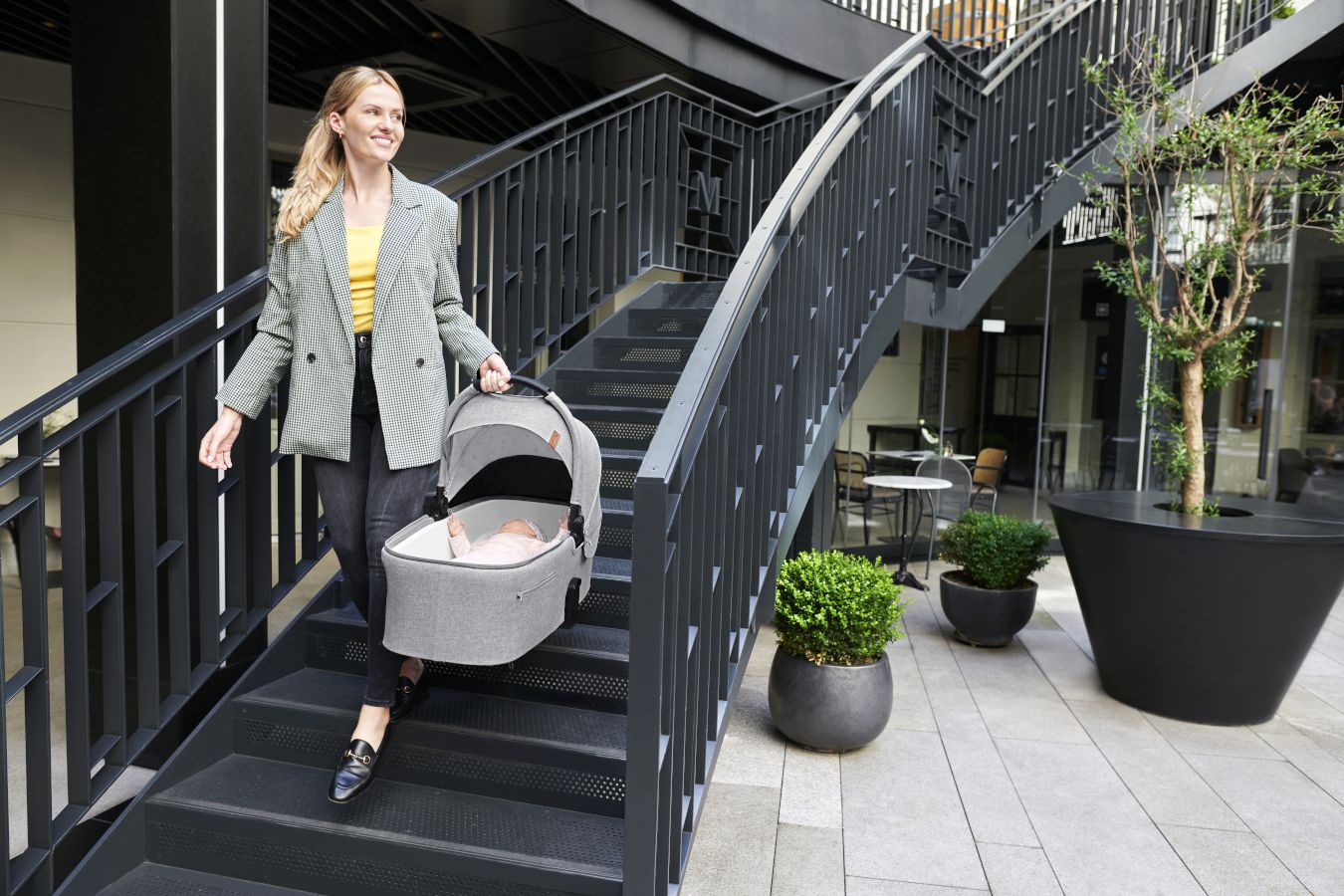Hospital bag for mum and baby

Are you and your partner getting ready for the big day and are wondering what to pack in your hospital bag? This is great, because you should do this in advance, as you may go into labour earlier than expected. It's good to prepare all your necessities yourself, so that you know what's where and won't need to unpack the entire bag looking for something. What should be in the hospital bag (and what don't you need)? We'll tell you!
Your documents and test results are a must.
The hospital bag should have a special place for your folder with all your documents. Make sure you can easily access them, because you'll need them in the beginning. To register at the hospital, you'll definitely have to show your personal ID card. It's possible that you'll also be required to provide the Tax ID of your employer, or yours if you have a business.
Which tests may the hospital staff expect from you? It's a fairly long list, but each of the results is required for you to be admitted to the ward – they ensure that your baby will be safe when coming in contact with you and your blood. Your pregnancy record is a must, as is a complete set of the ultrasound tests you had during the pregnancy – it is recommended that you undergo at least four such tests during the nine months of pregnancy. You should also have been tested for the HBs (hepatitis B) antigen, WR (VDRL for syphilis), HIV and GBS (vaginal swab for streptococcus). In some cases, an anti-Rh antibody test (serological conflict) may also be recommended. Information on your blood type will also come in handy. If you're under the medical care of a specialist, you should also take the test results you have from this doctor. And if there's an indication for a C-section, you should perform the following additional tests: sodium, potassium, and coagulogram, and to have your C-section referral with you. Don't forget to also prepare a birth plan, in which you'll outline your expectations as to what will be happening with you in this amazing moment. You'll give it to your midwife.
What does a mum need? Mum's necessities
The list of things that you'll need at the hospital can be divided into two parts – a kit you should take with you to the birthing ward, because it'll come in handy during labour, as well as a bag you'll use straight after giving birth. Let's start with what will be useful in the very beginning.
A nightgown will be the most comfortable thing you can wear during labour – take several with you and remember that it's very likely they won't come back in perfect condition. It would be great if they were already adapted for breastfeeding, meaning they should be loose or can open from the front. A bathrobe is also great so that you can freely move about the hospital. You'll certainly also appreciate comfortable slippers and warm socks. Have a water bottle handy, ideally with a convenient spout. Then there are wet wipes and tissues, a small towel or handkerchief from which you can make a compress. Your lips may dry out if you're breathing heavily, so a lip balm may also be useful. There are products, such as 2-in-1 cosmetics with lanolin, which you can use on both your lips and nipples, which may be painful during breastfeeding right from the outset.
The list of items that you'll need after birth is equally long, if not longer. Again – nightgowns, but not necessarily the ones in which you'll give birth, but fresh ones that open from the front and are comfortable for breastfeeding. You'll also need postpartum underwear and hygiene products: special postpartum underwear, thick pads or special nappies. Make sure you have a special, comfortable and soft bra, as well as nursing pads. Don't forget your personal hygiene products: shower gel, shampoo, intimate hygiene products, antiperspirant deodorant, toothbrush and toothpaste. Also take a small and large towel. For hygiene reasons, consider taking toilet seat covers. What else? Slides to shower in, a hairbrush and a comb. It's also good to have comfortable clothing for when you're leaving the hospital. You should also have your own Octenisept, because hospitals don't always provide it.

Hygiene products for your baby at the hospital
When it comes to hygiene products for your baby, two things are the most important: nappies and nappies. Cloth nappies are extremely useful and versatile. You can use them to snuggle your littlie if needed, cover your baby and wipe anything your long-awaited arrival spits up. Hospitals normally have plenty of disposable nappies for your newborn, but you should have your own package to always have some on hand. And that's all of the most important items. Baby changing liners, several packets of wet wipes, Octenisept and nappy rash cream will definitely also come in handy. Don't forget that you're going to the hospital, and the staff will be able to provide you with many care products you'll need.
Clothes for newborns at the hospital
Before you go to the hospital, check to make sure that the birthing unit doesn't have a ban on bringing your own clothes. Some facilities are quite strict about this and provide all the newborn clothing items you'll need. But if your hospital is different, your hospital bag should have at least several pieces of small clothing. What mustn't you forget? You'll definitely need kimono cardigans and bodysuits (with a long sleeve, three pieces) that do up at the front, plus three pairs of loose bottoms. You'll also need two types of hats – a thinner one for indoors, and a thicker one – especially if you're giving birth in winter. And then there are socks. Of course, you need at least three such sets.
When packing the clothes, don't forget that littlies feel temperature completely differently to adults. They can be cold, even if we're hot. So you should dress a newborn in long sleeves, a hat, socks, and on top of it all, wrap them in a swaddle or blanket. In winter, you've also got to have a pramsuit.
Cosmetics for your newborn
Cosmetics for newborns aren't necessarily the most important part of your hospital bag, because your new arrival doesn't need too many. Wet wipes will definitely come in handy when your baby spits up or needs a nappy change. When choosing wipes, check the ingredients to avoid any irritants. You can also buy something to prevent nappy rash. And if your baby does get nappy rash, which unfortunately happens often, you can soothe it with the right creams. Don't forget to buy high-quality nappies in case this happens. You'll also need a gentle cream for your littlie's bottom.
Wraps, swaddles and blankets
We've already mentioned that a newborn needs more warmth than you may think. Wraps, swaddles and blankets will help, and so should be an important part of your hospital bag. Two or three such accessories should be enough for your time at the hospital. They'll all also help you hold your baby while feeding.
Swaddles have one more important benefit: they fit your newborn snugly, meaning your darling will feel safe. After all, they've only just left your tight belly, so they associate tight spaces with the comfort and closeness they're familiar with from their life inside. That's why babies fall asleep better and suffer less from colic if they're wrapped like this.
A wrap has similar uses and functions. But it's thicker, meaning it's warmer. You'll find wraps in two options – softer and stiffer. The latter is better at stabilising your baby's position and makes it easier for you to hold them firmly.
Blankets are loved for their versatility. They can be used as both swaddles and wraps, or also to cover your littlie.
Your newborn going home from the hospital
The moment will come when you need to leave the hospital. You also need to think about this time, but not necessarily before the birth. You'll have time, and you'll have other things on your mind before going to the hospital. Why not ask someone close to you to prepare a bag to take home – they can put together all the clothes and accessories you'll need to leave the hospital with your new arrival. The list of necessary items includes the right clothes and a car seat. Some people may be surprised that your newborn may not leave the hospital in your arms – even if you're walking home because you live close by. Every child must be placed in a car seat that has an infant carrier function. But that's not all. Make sure your littlie is warm. Long sleeves, socks, a hat – these are the basics to take your baby outdoors for the first time. On top of that, you'll need a blanket (with a thickness suitable for the time of year). If you're giving birth in winter, remember that you may not put your newborn into a car seat in a jacket – just like your littlie shouldn't ride in the car in a jacket. For the time being, a thick blanket will act as the outer garment – you can snuggle your baby in it before you leave the hospital.

List of items to take to the hospital – hospital bag for mum and baby (infographic)
For mum:
Documents and test results:
- personal ID card
- Tax ID – your own or your employer's
- pregnancy record (book)
- blood and urine test results
- ultrasound results from the pregnancy
- hepatitis B antigen
- WR and HIV test results
- in some cases, anti-Rh test results
- mother's blood group
- vaginal swab for streptococcus (GBS)
- if you're under the care of a specialist – test results from the doctor
- if a C-section is planned – the level of potassium and sodium, coagulogram, and your C-section referral
- birth plan
For labour:
- 3-4 nightgowns
- warm socks
- bathrobe
- small towel or handkerchief
- packet of tissues
3-4 packets of wet wipes
- lip balm or lanolin
- special post-birth pads
- mineral water in a bottle with a spout
- phone with charger
After birth:
- 1-2 fresh nightgowns for feeding
- clean bathrobe
- slippers, slides to shower in
- 4-5 pairs of postpartum underwear
- postpartum pads
- special bra for feeding and nursing pads
- personal hygiene products: shower gel, shampoo, intimate hygiene gel, toothbrush and toothpaste, antiperspirant deodorant, comb, brush
- two towels
- toilet covers
- medications prescribed by doctors – the hospital doesn't provide them
For your newborn:
- 3-4 bodysuits, 1-2 rompers
- thin seamless hat
- wrap, swaddle or blanket (or all of them)
- 5-6 cloth nappies
- small packet of newborn nappies
- cosmetics: 2-3 packets of wet wipes, cream for the bottom, nappy rash product
- clothes for leaving the hospital
- 0-13 kg car seat with an infant carrier function

Things you don't need to take to the hospital
What you don't need to take to the hospital isn't any less important than what you do need to take. Remember that your hospital bag should only have the minimum necessities – everything else isn't required. All toys, teddy bears, rattles and teethers can wait for your darling in their room – the hospital isn't a place to play. Mum also doesn't need make-up accessories – you'll probably have neither the time nor the energy for such things. And perfume can be irritating for your littlie. Nursing pillows also won't work. Bottles and nail clippers are also accessories that you won't use in the hospital.
